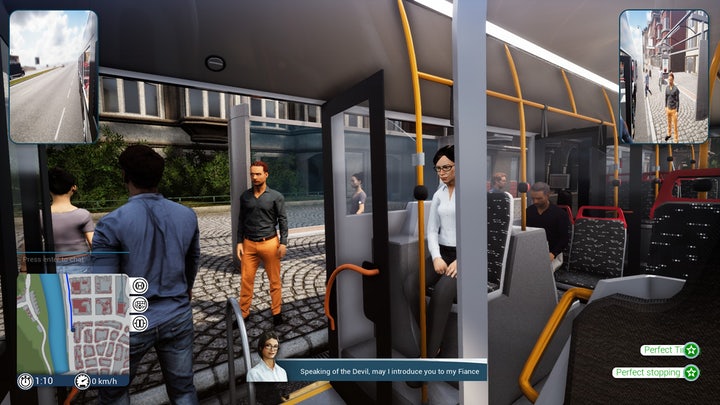Reading Luke Plunkett’s, “Ive Been Driving a Video Game Bus, And It’s Wonderful” makes me consider what makes the nature of games such that the mundane can be captivating, in a way other mediums have been unable to capture? Plunkett describes his enjoyment of the game Bus Simulator 19, which, as the title implies, simulates the experiences of a bus driver, with a high level of detail. There’s not a story, not something else that becomes revealed after the initial hook; just exactly what the game claims to do. And yet Plunkett claims it is “more than enough to keep you busy.” So what makes Bus Simulator 19 successful as a game?

Of course, there have been plenty of works in other mediums about the mundane. Even about the mundane lives of bus drivers (Jim Jarmusch’s film Paterson comes to mind). Each medium finds its own way to explore the mundane, be it a cinematic character study, a 500 page book exploring exploring every avenue of what it means to drive a bus, or a detailed painting of something ordinary. Each medium approaches the mundane with a different approach that works to its strengths, and for me, video games’ unique ability is to offer the experience of the mundane. You don’t watch the bus driver. You are the bus driver.

The article describes the intricacies the game involves the player with, from hitting curbs to printing tickets. Each of these details, ones that the player most likely barely ever considered, suddenly take on importance. They become “as satisfying as any time I’ve landed an X-Wing.” Thus, the game allows the player to experience the stakes themselves, however high or low.
Source:
“I’ve Been Driving A Video Game Bus, And It’s Wonderful” (Luke Plunkett, Kotaku, 2018)


I think this is a really cool take on the mundane! It makes me wonder, however, if a kind of action is required in the experience of the mundane, rather than watching, is there no pleasure to be derived from the voyueristic aspects of the mundane? Can there be a form of viewing that is active, or does it involve specific gameplay actions?
Unless I am understanding your question incorrectly, I think that the only way to achieve pleasure from the voyeuristic aspects of the mundane is simply to watch, as voyeuristic pleasure is granted through sight, through seeing things that you shouldn’t–or in this case, things that you often don’t realize. From this, I don’t believe that an action is required–watching, passively or actively, is often enough–but actions can occasionally help people recognize the mundane. After taking the bus so many times, someone might realize that the motion of taking the bus has become so normalized that it is mundane. There, they can receive the pleasure of the action: they can sit and recognize the normalcy of it all and find something beautiful in it, instead of just letting the bus ride become another bus ride to their destination. This can be applied to many other things (making eggs and finding something unique in its sizzling and smell, braiding hair as Ash brought up and remembering this old routine, the looping motion of shadows in the sunlight, etcetera and so forth).
“What makes the mundane captivating,” is an interesting question that you raise. What makes a game about something we can do in real life so interesting that we deign to play it over and over again for our own pleasure rather than work. I’ve always thought it was about the idea of choice and lack of consequence. Within these mundane games and worlds, you are able to choose to try over and over again, and the rules are set by you. You can choose when to stop or when to start; it’s sort of like when someone else tells you to do something you don’t want to, but by yourself it would’ve been fine. Additionally, the lack of real-life consequence makes everything less panic-inducing and more casual.
Great article!
I completely agree about the experience of the mundane that videogames offer; the experience (to me) is why I find the mundane as a topic more enjoyable in this than other mediums. That being said, do mediums that capture the mundane as boring enforce the quality of mundane? Does gamifying the mundane actually make it not mundane?